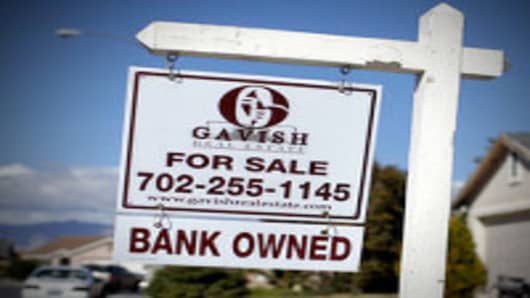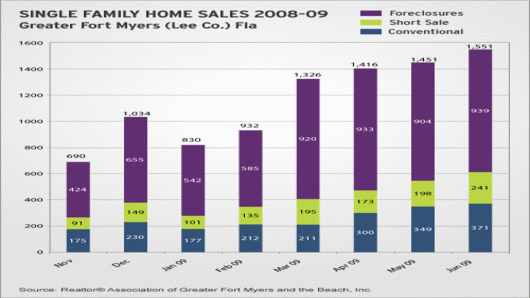Business is booming in Greater Fort Myers in Lee County, near the southern end of Florida’s west coast, where realtor Suzanne Sherer is working seven days a week. Sherer says sales at her six-person firm are back at 2005 levels.
“We’re seeing bidding wars on entry-level homes,” says Sherer. “Within three days of listing, we have multiple offers.”
Sales there are up 116 percent year to date through June. Inventory is down to a 3.5-month supply, about a third of what it was last summer.
Before you conclude the real estate boom of a few years ago is alive and well, consider one word: Foreclosures. What was once a bane is now a boon for some players in the real estate game, but there's considerable debate about whether it signals the coming of overall housing market recovery.
“You have to be able to evolve with the market,” says Sherer, who’s also president of the area Realtor association. “You have to be knowledgeable about foreclosures, short sales, and guide people through the whole process."
From one region to the other, a powerful pattern is emerging in the national real estate market. In areas where state foreclosure rates are among the highest—Florida (3rd), Arizona (2nd), California (4th) and Nevada (1st)—sales are booming, partly because prices are so low; on the flip side, in states like with the lowest foreclosure rates—Kentucky (40th) West Virginia (48th) and Iowa (41st), Nebraska (45th) —prices are often stable or the declines modest, while sales are down, usually in the singe digits.
“In some of the worst markets, it’s not usual in any given month for 80 percent of the sales to be distressed properties,” says Rick Sharga, SVP at RealtyTrac, whose foreclosure rate data are widely followed. "In some of the worst markets, we're starting to see that the market has overreacted. We're seeing bidding wars similar to what we saw in the boom.”
The National Association of Realtors first started polling members on foreclosures and short sales in March 2008 and has been doing so monthly since last October. Nationwide, such transactions have ranged between 31 percent and 49 percent of total sales this year.
In Sherer’s area, Cape Coral—Ft Myers—one of the hardest-hit in the national housing swoon— the median price of a home was down 59.1 percent from a year ago during the first quarter according to the National Association of Realtors.
Of the 1,551 single-family units sold in June, 939 (61 percent) were foreclosed properties—or REOs, meaning the property is owned by the lender after an unsuccessful foreclosure auction. Another 241 (15.5 percent) were short sales (last-minute desperation sales to avoid foreclosure). That pattern has been in place since last November.
Foreclosed properties were selling at a 60-percent discount to the median sales price for a conventional transaction. Short-sale properties were fetching 40-percent less.
“Distressed homes have definitely influenced our pricing in the current market,” said Sherer. “We're seeing a strong contingent of investors, gobbling these properties up, with a quick turnaround, paying cash. Cash is king.”
Across the country, in the greater Las Vegas area, single-family home sales hit a record 4,702 in June, according to the local realtor association. Prices there are down 37.3 percent from a year ago. The state has the highest foreclosure rate in the nation.
No wonder then, that 74 percent of June sales were bank-owned properties. Four out of 10 transactions were paid for in cash and 62 percent of all homes sold within 60 days.
"(Foreclosed) properties are almost selling faster than we can get inventory," says long-time realtor Rick Shelton. "Inventory is extremely depressed."
Shelton says sales have been increasing 15-20 percent a month lately and expects his 200-agent firm to sell a record 3,000 properties this year.
Shelton says he's "challenged" selling conventional homes. "It's very tough for them. Once in a while you’ll get a hit and miss."
_____________________________________
Calculators and Advice from Bankrate.com:
- Compare Mortgage Rates Nationwide
- Struggling to Save Your Home? Get Help Here
_____________________________________
By comparison, in Iowa, whose foreclosure rate was the 41st lowest in June, sales were down about 10 percent on a yearly and quarterly basis in the first quarter. Prices in the biggest metropolitan areas such as Des Moines and Waterloo-Cedar Rapids were down 7.2 percent and 6.4 percent respectively. In neighboring Nebraska, 45th in foreclosures, the trends are even more pronounced.
In Corpus Christi, Texas (29th in foreclosure rate), mortgage broker Jim Pair, says foreclosures “are not helping or hurting the market,” which he describes as a relatively stable one. The median home price there was down about 8-percent from a year ago in the fourth quarter.
Pair, the new president of the National Association of Mortgage Brokers, says the “last three-four months have been pretty good,” but estimates business is down 30-percent from its 2006 peak.
In one way, the boom is a shot in the arm for the beleaguered real estate industry, which has seen single-family unit sales fall from an annual pace of almost 6.5 million units in 2006 to 4.6 million through May of this year.
To be sure, with the median price tumbling from $222,000 to $168,000 during the same period, and buyers and sellers both balking at the traditional 6-percent commission rate, the average transaction is less lucrative. At the same, it takes less time to market and sell a foreclosed property.
Five years ago, it took an average of 120 days from listing to closing on a foreclosed property, now its down to 105 days, according to real estate giant Realogy, which handles foreclosures for many lenders across the country and has about 600,000 homes listed for sale in the 50 states.
What's good for realtors, however, may not be good for the overall real estate market as well as homeowners across the nation.
“It depresses prices because people are using them in their comps [comparative pricing], which is incredibly unfair; it’s a deep discount to market and they’re selling for that reason,” says Richard A. Smith, CEO of Realogy, whose holdings include Century 21 and Coldwell Banker and ERA.
The foreclosure crisis has been crushing for those losing their homes, but it is also claiming less obvious victims.
"The downside is that there is a loser in every equation," says Shelton. "All of this doesn't doesn’t bode well for the guy who owes $800,000 on his house and it's worth $600,000."
Whether the foreclosure boom is a precursor to an overall housing recovery or the real estate version of a stock market false bottom is a matter of some debate.
“In the initial phase it was a drag on the market, bringing overall prices down," says Lawrence Yun, chief economist for the NAR. “Now buyers are saying, ‘That's a good price’, meaning a low price. Because there are buyers, a bottom is forming.”
Smith of Realogy sees no silver lining. "Take the REO [foreclosure] business away, and you are back to 1997-1998 levels and that is a scary proposition."





